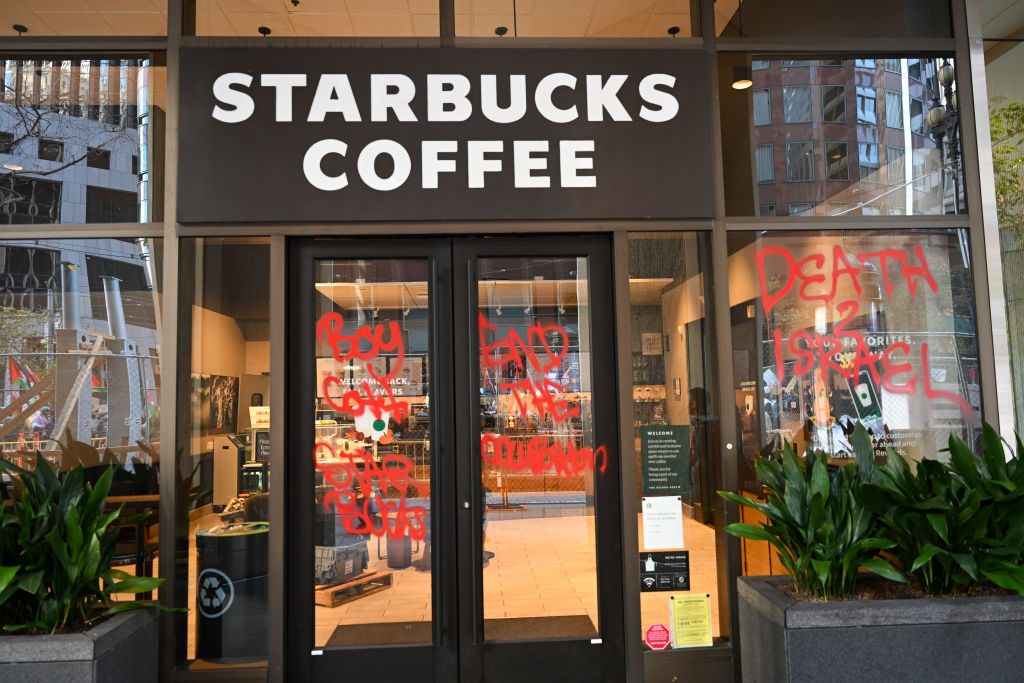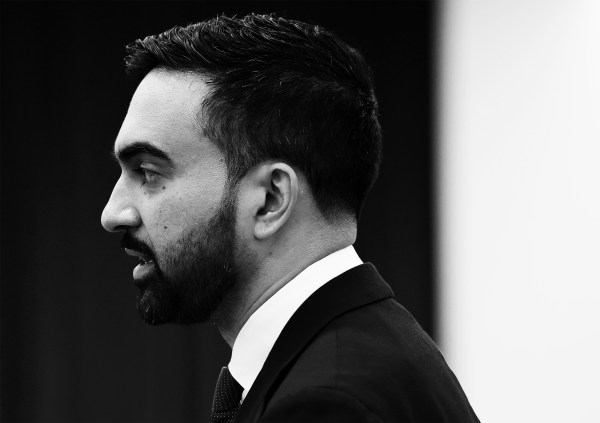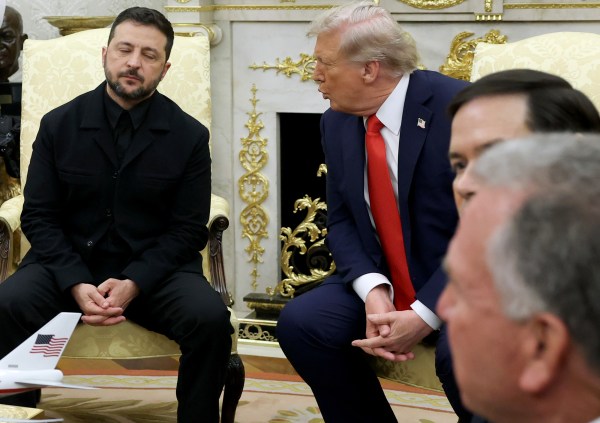A lynch mob overran an airport in Russia’s southern Dagestan region on Sunday, chanting “Allahu Akbar” and searching for Jewish passengers on an inbound flight from Israel. The attack injured at least 20 people (two critically) and came a day after similar scenes outside a nearby hotel rumored to be “full of Jews.”
The Russian riots became the latest examples of antisemitic violence since the October 7 terrorist attack on Israel killed more than 1,400 people.
Once considered a safe haven for Jewish refugees fleeing persecution, the U.S. is now confronting its own rising tide of antisemitic violence. The number of antisemitic incidents in America—a metric that includes reported incidents of vandalism, harassment, and assault targeting Jews—rose to 312 since Hamas’ massacre from 64 in the same period last year, the Anti-Defamation League reported last week. And Western Europe has experienced similar surges amid massive pro-Palestinian demonstrations. In London, where thousands have taken to the streets to call for “intifada,” authorities recorded 218 antisemitic hate crimes from October 1 to October 18 compared with 15 in the same period last year.
The demonstrations and antisemitic incidents underscore the increasingly blurred lines between people who claim to oppose the actions of the Israeli government, those who call for death and destruction to befall Jews in general, and the latest, potentially lethal strain of antisemitism taking hold in liberal-minded countries: anti-Zionism—a movement that rejects the state of Israel’s right to exist.
Hamas’ opening salvo wasn’t an attack on a state: It was an attack on a people. After overrunning military bases in southern Israel, Gazan terrorists turned their sights on the civilian population, committing atrocities that—had they not been recorded by the perpetrators themselves and later verified by forensic teams—might be too horrific to comprehend. In one video, terrorists shoot an already-deceased Israeli civilian at point blank range. In another, an attacker opens fire into a family’s living room.
As more forensic evidence is uncovered in the monstrous and ongoing task of the recovering corpses, new disturbing details emerge by the day. The attackers tortured and murdered infants, committed rape as a weapon of war, and abducted hundreds—all hallmarks of a genocidal campaign.
“Barbarism and burning and beheading, rape and murder, the bludgeoning of babies, of whole families in their homes,” Michal Cotler-Wunsh, Israel’s special envoy for combating antisemitism, said in an interview with The Dispatch. “Atrocities too terrible to imagine, but not too terrible to have happened.”
“It’s so horrific,” she added, “and what’s not less horrific is days—not years, not decades—days after these atrocities, these war crimes, these crimes against humanity are denied, are justified, are excused, are celebrated.”
Outside of the famous Sydney opera house just two days after the initial massacre, pro-Palestinian demonstrators chanted “gas the Jews.” Elsewhere, protesters have been less graphic but no less explicit in their calls for antisemitic violence, using anti-Zionism to support the ethnic cleansing of Jews and Israelis. One popular rallying cry, “from the river to the sea, Palestine will be free,” demands the creation of a Palestinian state within Israel’s current borders.
With the violent rhetoric come threats of literal violence. Over the weekend, an ultra-Orthodox news site advised Jews in New York City’s predominantly Orthodox neighborhood of Crown Heights to stay home to avoid running into a pro-Palestininan march on Saturday afternoon. Jewish community centers, schools, and synagogues across the world have been forced to bolster their security since October 7. At least 20 Jewish schools in Paris were evacuated Monday due to bomb threats.
College campuses across the U.S. have experienced their own waves of antisemitism masquerading as anti-Zionism, as students and faculty couch their opposition to Israel and its inhabitants in academic language. In an open letter condemning the backlash against students defending Hamas’ attack, Columbia University and Barnard College faculty members doubled down Monday, describing the torture and slaughter of civilians as a “military response by a people who had endured crushing and unrelenting state violence from an occupying power over many years.” (Israel hasn’t occupied the Hamas-run Gaza Strip since 2005.)
Other academics have openly celebrated the attacks. One Cornell University professor is now on a leave of absence after he hailed October 7 as “exhilarating” and “energizing.” “Hamas has shifted the balance of power,” he said before a crowd of students. “Hamas has punctured the illusion of its invincibility.”
But the scholarly framing didn’t stop the rant from reaching the same logical conclusion as other inciting speech: literal violence against Jews. The Cornell University Department arranged security for Jewish students after graphic antisemitic threats surfaced online over the weekend, including calls to rape Jewish women and behead Jewish babies—invocations of the Hamas attack in Israel. The incident followed the appearance of graffiti stating “Israel is fascist,” “Zionism = genocide” and “F— Israel” on campus four days prior.
At Tulane, where Jewish students make up some 50 percent of the undergraduate population, pro-Palestinian protests erupted into violent clashes after demonstrators—many of whom Tulane President Michael Fitts said were not affiliated with the school—yelled antisemitic slurs and tried to light an Israeli flag on fire. And at Cooper Union, a private college in Manhattan, library staff decided to barricade Jewish students in the building as a mob of demonstrators pounded on the door yelling “Free Palestine” last week.
Despite purporting to defend Palestinians affected by Israel’s war against Hamas, the wave of antisemitic hate sweeping the U.S. has “nothing to do with Palestinian rights or peace—the opposite,” Cotler-Wunsh argued. “Anybody who cares for Palestinians would now be absolutely extricating the Palestinians from Hamas—a genocidal terror proxy of a genocidal terror regime in Iran that has no value for human life. False moral equivalence empowers terror.”
The Biden administration on Monday introduced a series of initiatives to help universities combat antisemitism, including directing federal law enforcement agencies to work with local authorities to protect Jewish students. But some Jewish advocacy groups have criticized the White House for not identifying anti-Zionism as a form of antisemitism, arguing the omission allows for antisemitism perpetuated under the guise of rejecting the Jewish homeland. The administration’s sweeping national strategy to counter antisemitism, released in May, recognized that opposition to Israel often stems from anti-Jewish discrimination but stopped short of explicitly condemning anti-Zionism.
Many people now see doing so as a moral imperative, particularly given the long history of discrimination against Israel in international bodies. Over the last eight years alone, Israel has been the subject of 140 U.N. General Assembly condemnatory resolutions. The next largest transgressor, Russia, has been singled out just 23 times and China, which is estimated to have imprisoned more than 1 million Uyghurs in Xinjiang since 2017, had never been condemned by the body. Yet U.N. Secretary-General António Guterres last week called for a ceasefire in Israel’s efforts to strike back at Hamas while seemingly blaming Israel for Hamas’ October 7 attacks, which he said “did not happen in a vacuum.”
Members of the international body, which was formed in the aftermath of the Holocaust in part to prevent future crimes against humanity, on Friday failed to advance a Canadian-led motion that would have condemned Hamas: 55 countries voted against the measure. Meanwhile, an Arab coalition-led resolution urging an immediate ceasefire passed by a vote of 120 to 14. Israeli Ambassador to the U.N. Gilad Erdan rejected the resolution as tantamount to telling the country not to defend itself. “We saw exactly what they dream of doing to every Israeli and Jew,” he said, “and we will not sit idly by to let them rearm and commit such atrocities.”
For Cotler-Wunsh, the terrorist group and its international apologists have unintentionally underscored an imperative of Israel’s existence: to protect the world’s Jewish population when nobody else will.
“The masks are off for anybody wanting to see: This is an assault on our shared humanity and the reason for the state of Israel to exist, so at the very least we can defend ourselves even if we die doing so,” she said. “It is an existential moment. It is Israel’s second independence war. And anybody who believes in the right of the state of Israel to exist in any borders, and in the imperative for it to defend itself to exist, has to stand up and be counted now.”
“Never again is right now.”







Please note that we at The Dispatch hold ourselves, our work, and our commenters to a higher standard than other places on the internet. We welcome comments that foster genuine debate or discussion—including comments critical of us or our work—but responses that include ad hominem attacks on fellow Dispatch members or are intended to stoke fear and anger may be moderated.
With your membership, you only have the ability to comment on The Morning Dispatch articles. Consider upgrading to join the conversation everywhere.